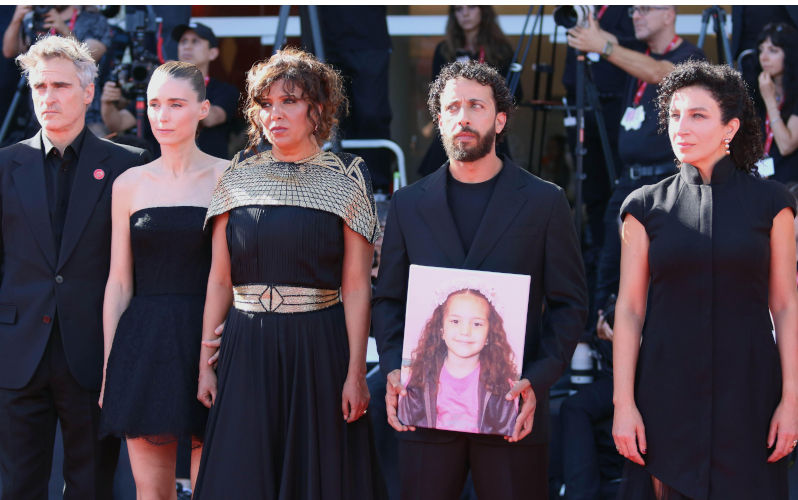'Let her voice echo': Hind Rajab film receives record-breaking standing ovation at Venice Festival
September 6, 2025
Tunisian filmmaker Kaouther Ben Hania’s harrowing drama “The Voice of Hind Rajab” left not a dry eye in the house on Wednesday night, earning over 20 minutes of standing ovation after its premiere at the Venice Film Festival.
As chants of “Free Palestine” echoed through the packed theatre, the applause only grew louder as the lights were dimmed in an apparent attempt to clear the room. Observers say the response set a film festival record.
Late addition executive producers Joaquin Phoenix and Rooney Mara attended the premiere, joining Ben Hania and the cast in holding a large photo of Rajab as they walked the red carpet. Phoenix, wearing an Artists4Ceasefire pin, appeared visibly moved during the ovation, as did many from the film’s team.
At one point, actor Motaz Malhees grabbed a Palestinian flag from the audience and waved it to cheers. The film, one of the most anticipated titles of the festival, had been expected to make a major impact, a prediction confirmed by its rapturous reception on Wednesday night.
The film tells the true story of five-year-old Hind Rajab, who became a symbol of Palestinian suffering after her family’s car was shelled while fleeing Gaza City on 29 January 2024. Trapped among six dead relatives, Hind remained on the phone with the Palestinian Red Crescent for three hours before she, too, was killed.
Two weeks later, her car — riddled with 335 bullet holes — and the ambulance sent to rescue her were found destroyed, with two medics dead inside. Built around the real audio of Hind’s final call, the film was shot in a single location in Tunisia.
The emotional day began with a charged press conference, where Ben Hania was greeted by another prolonged ovation before Palestinian-Canadian actress Saja Kilani read a statement on behalf of the cast and crew.
“Hind’s story carries the weight of an entire people,” she said. “Her voice is one amongst 19,000 children who lost their lives in Gaza in the last two years alone… Let Hind Rajab’s voice echo in every theatre, let it remind you of the silence the world has built around Gaza.”
In an interview with the Associated Press the day before the premiere, Ben Hania explained that she felt compelled to make the film after hearing the 70-minute emergency call Hind made before she was killed.
“I felt like she was asking me to rescue her,” she said. “It’s not rational what I’m saying, because I knew the tragedy already happened. I asked of myself, ‘What can I do,’ and I only know one thing: how to tell stories.”
She added that she put aside another project to complete the film as quickly as possible: “There was kind of an emergency that I was feeling and I contaminated everybody.”
Various media outlets have clocked the ovation at between 21 minutes and just under 24, placing it among the longest in festival history. Until now, the Venice record was held by Pedro Almodóvar’s The Room Next Door, which received 18 minutes of applause last summer. For comparison, Guillermo del Toro’s Pan’s Labyrinth famously drew a 22-minute ovation at Cannes in 2006.
Critical response has been overwhelmingly positive, with Vulture news website hailing it as “the most powerful film at Venice,” and Deadline calling it “the lightning rod the Free Palestine movement has been waiting for.”
Variety offered a more measured take, praising the film’s emotional impact but questioning whether the dramatisation surrounding Hind’s real-life audio “risks trivialising its documentary core rather than enhancing it”.
Tunisia, however, is clearly banking on the film’s triumphant reception at Venice, reportedly selecting it as its official submission for the Academy Awards in the Best International Feature category.
Republished from Haaretz, 4 September 2025
The views expressed in this article may or may not reflect those of Pearls and Irritations.

